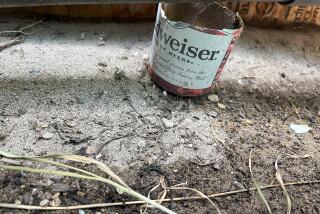U.S. Authorities Try to Put Freon Black Market on Ice
- Share via
WASHINGTON — The federal government launched a nationwide attack Thursday against a growing U.S. black market in Freon, a banned air-conditioning chemical that threatens the ozone layer but is being smuggled into the country in large quantities along the routes of drug traffickers.
The imported material, purchased for as little as $2 a pound and fetching as much as 10 times that on the black market, has been brought in from Russia, China, India, Australia and Britain, among other locations, and shipped through Mexico and Canada, officials said.
“CFC smuggling spans all of our borders,” said George Weise, commissioner of the U.S. Customs Service. “We are now seeing a dramatic shift in smuggling of CFCs from Miami to our southwest border with Mexico--almost the same pattern we have seen with drug smuggling. There are indications of major smuggling operations in Texas [and] California, some of which involve Russian organized crime and are transcontinental in scope.”
The Justice Department announced that 15 people had been indicted in Los Angeles, San Diego, Houston, Miami, Philadelphia and Savannah, Ga. In Los Angeles, Dennis R. O’Meara, president of a company that recycles imported gases, was charged in a four-count indictment alleging that his firm illegally imported 28 1-ton containers of used refrigerants through the Port of Los Angeles.
Producing and importing Freon, the commercial name for a type of chlorofluorocarbon, or CFC, has been outlawed in the United States since Jan. 1, 1996. The refrigerant is used in older auto air-conditioning systems. It is widely believed to deplete the ozone layer, which protects the Earth from the sun’s radiation.
Atty. Gen. Janet Reno said that since 1994 the Justice Department, the Environmental Protection Agency and the Customs Service have seized 1.5 million pounds of the illegally imported gases, worth up to $18 million. But officials have estimated that at least 20 million pounds were brought into the United States illegally just last year.
With the indictments, said EPA Administrator Carol Browner, “we are sending a clear message that we will not tolerate smugglers who are jeopardizing the health of American families and people around the world.”
Depletion of the ozone layer has been linked to cataracts and skin cancers.
O’Meara, president of Omega Refrigerant Reclamation Corp. of Whittier and Irwindale, told The Times that he had been recycling refrigerants for 30 years and “I have never sought to conceal anything.” He said he had been involved in a dispute over paperwork with the EPA and the Customs Service for 18 months.
O’Meara attributed his indictment to “mistakes and screw-ups” by EPA officials who failed to respond within the required 15 days to petitions and other documents he had submitted relating to his business. He said his imports came from Britain and Australia and “we have met every one of the guidelines” promulgated by those governments and by the United States.
“Unfortunately when you’re a little guy, these situations are very frustrating and very difficult to fight,” he said.
The potential for a black market in chlorofluorocarbons began to grow after an international agreement reached by 161 nations in 1987 set a timetable for phasing out their use around the world--as far off as 2010 in poorer nations. By 1992, the United States had put into place regulations imposing excise taxes and allocations for imports, before banning them as of last year.
The Justice Department said the current stockpile of the gas will last two years and it is being sold to certified distributors and service stations to replenish air conditioners in the 80-million operating vehicles built before 1994. The department said that after the stockpile is depleted, the air-conditioning systems in the older cars and trucks can be modified at a cost of as much as $300 to run on a safer refrigerant.
Department officials said that although they have prosecuted others on Freon-smuggling charges in recent months, the new round of indictments reflects the growing scope of the problem and the fruits of an initiative that began quietly in November 1995.
At the same time, the agencies involved in the prosecution are trying to draw the public’s attention to the environmental problems posed by chlorofluorocarbons and to discourage the use of the gases that have been brought into the country illegally and made available at cut rates.
Reno said, “To legitimate companies, we say, ‘You can still service or refit older cars, but we need your help to stop the use of smuggled CFCs.’ To people who service cars or distribute refrigerants, we say, ‘If you’re offered something at a price that seems too good to be true, it probably is.’ ”
And to would-be smugglers, she added, “We will not let you endanger our ecosystem and our children’s future for a few dollars.”
More to Read
Sign up for Essential California
The most important California stories and recommendations in your inbox every morning.
You may occasionally receive promotional content from the Los Angeles Times.










